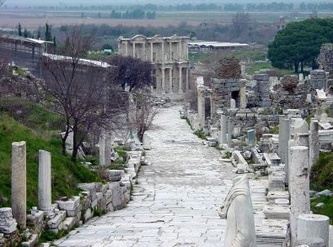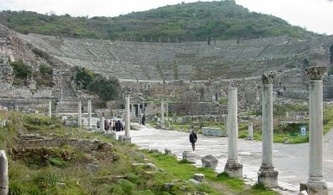 What do we learn about “mission” in the Book of Acts? We are concerned today with Acts 19’s famous report of the disturbance over the financial and religious impact if more and more folks decide to follow the gospel preached by Paul:
What do we learn about “mission” in the Book of Acts? We are concerned today with Acts 19’s famous report of the disturbance over the financial and religious impact if more and more folks decide to follow the gospel preached by Paul:
19:23 At that time a great disturbance took place concerning the Way. 19:24 For a man named Demetrius, a silversmith who made silver shrines of Artemis, brought a great deal of business to the craftsmen. 19:25 He gathered these together, along with the workmen in similar trades, and said, “Men, you know that our prosperity comes from this business. 19:26 And you see and hear that this Paul has persuaded and turned away a large crowd, not only in Ephesus but in practically all of the province of Asia, by saying that gods made by hands are not gods at all. 19:27 There is danger not only that this business of ours will come into disrepute, but also that the temple of the great goddess Artemis will be regarded as nothing, and she whom all the province of Asia and the world worship will suffer the loss of her greatness.”
19:28 When they heard this they became enraged and began to shout, “Great is Artemis of the Ephesians!” 19:29 The city was filled with the uproar, and the crowd rushed to the theater [left] together, dragging with them Gaius and Aristarchus, the Macedonians who were Paul’s traveling companions. 19:30 But when Paul wanted to enter the public assembly, the disciples would not let him. 19:31 Even some of the provincial authorities who were his friends sent a message to him, urging him not to venture into the theater.19:32 So then some were shouting one thing, some another, for the assembly was in confusion, and most of them did not know why they had met together. 19:33 Some of the crowd concluded it was about Alexander because the Jews had pushed him to the front. Alexander, gesturing with his hand, was wanting to make a defense before the public assembly. 19:34 But when they recognized that he was a Jew, they all shouted in unison, “Great is Artemis of the Ephesians!” for about two hours. 19:35 After the city secretary quieted the crowd, he said, “Men of Ephesus, what person is there who does not know that the city of the Ephesians is the keeper of the temple of the great Artemis and of her image that fell from heaven? 19:36 So because these facts are indisputable, you must keep quiet and not do anything reckless. 19:37 For you have brought these men here who are neither temple robbers nor blasphemers of our goddess. 19:38 If then Demetrius and the craftsmen who are with him have a complaint against someone, the courts are open and there are proconsuls; let them bring charges against one another there. 19:39 But if you want anything in addition, it will have to be settled in a legal assembly. 19:40 For we are in danger of being charged with rioting today, since there is no cause we can give to explain this disorderly gathering.” 19:41 After he had said this, he dismissed the assembly.


